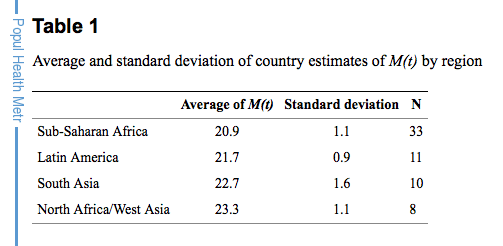In researching a recent article on creationism, I came upon a particularly strange claim. One reason evolutionary scientists believe that humans originated in Africa is the greater diversity within mitochondrial DNA among peoples in Africa than among peoples elsewhere. Of course, creationists claim that humans originated in Turkey, at Ararat, where Noah’s Ark landed after the flood, and not in Africa. That means they have to explain the diversity in African mitochondrial DNA.
And so they have. Sort of. Frankly, I almost had to check the URL to make sure I was still on the Answers in Genesis website, because their solution was that out there. Here is an excerpt from an article by Answers in Genesis’ Nathanial T. Jeanson:
…African ethnic groups have about twice as many mtDNA differences among them as do non-African ethnic groups. If you assume that the rate of mtDNA mutations is constant with time, the fact of greater mtDNA diversity in Africans implies that Africans have been around longer than non-Africans.
However, implicit in this conclusion is a technical assumption about the mtDNA mutation rates. … Evolutionists implicitly assume that the generation times (time from birth of parent to birth of child) across all ethnic groups are the same.
However, marriage data from the United Nations suggests that this assumption is not valid (Table 5). On average, African females marry earlier in life than non-African females. About 32% of African women are married by ages 15–19 whereas only 12% of non-African women are married by the same age. … Since mtDNA is passed on maternally, these data imply that some African ethnic groups have twice as many mtDNA differences because twice as many generations have passed in their lineages as compared to non-African lineages.
…the YEC predictions correctly predicted the African mtDNA differences under the assumption of a higher generation time (e.g., assuming a generation time of 15 years…. The mtDNA differences among non-Africans … were predictable under the YEC model by assuming a generation time of 25 years…. Thus, the fact of higher mtDNA diversity in Africans does indeed appear to be due to their earlier age of marriage (and, presumably, of child-bearing), not to their supposed ancient evolutionary origin.
Yes, you read that right. The claim here is that Africans have more diverse mitochondrial DNA than non-Africans because they have seen twice as many generations as non-Africans. Yes, the claim really is that Africans have borne children at substantially lower ages than non-Africans for all time, a claim made based on modern marriage data from the United Nations.
Before we get into any of that, I want to note that Jeanson’s assumed generation time of 15 years for Africans is not reflected in modern data. This page suggests that average age of a mother at first birth in most African countries hovers around 19 to 21. Why Jeanson assumed a generation time of 15 years at all when, according to his own data, fewer than half (32%) of African women are married not by age 15-19 is a mystery. After all, 32% of women being married by age 15-19 suggests that only a small number would have married at 15, even if you assume an equal distribution.
Let’s have a look at this study to flesh this picture out:
Estimates … were obtained … for the most recent DHS surveys in 62 developing countries for which data files are available for public use (and with sample sizes of married women above 3000).
…
A full analysis of levels and trends in all 62 countries is beyond the scope of this methodological study, but a few findings can be noted. Estimates of M(t) [average age at first birth] vary widely among countries from a low of 19.1 in Niger (2006) to a high of 24.7 in the Maldives (2009). The unweighted averages of M(t) for countries in each of four regions are presented in Table 1. The low value for sub-Saharan Africa is unsurprising since this continent has not progressed as far through the fertility transition as the other regions. North Africa/West Asia and South Asia have the highest averages and Latin America has intermediate values.
Table 1 compares the average age of first birth in 62 developing countries in Sub-Saharan Africa, Latin America, South Asia, and North Africa/West Asia, listing the average for each area. Sub-Saharan Africa has the lowest average age at first birth—20.9 years—while North Africa/West Asia has the highest—23.3 years—and Latin America and South Asia have averages in between—21.7 years and 22.7 years respectively. To say that this data does not back up Jeanson’s claim that generations occur twice as fast in Africa as elsewhere would be an understatement.
Jeanson has another problem as well. The authors of the above article note that developing countries in sub-Saharan Africa likely have the lowest average age at first birth because “this continent has not progressives as far through the fertility transition as the other regions.” In other words, there are modern reasons for Africa’s comparatively low current age at first birth vis a vis other countries. This is not some underlying constant.
The average of of first birth in the U.S. has in recent years increased to around 26. Note that I used the word increased. Average age at first birth is something that changes over time. The relatively high average age of first birth in many western countries today is due to specific circumstances associated with modernity (circumstances that will increasingly affect sub-Saharan Africa as well). Regardless of region, the average age at first birth varies depending on many factors—including the availability of resources—and changes over time.
One final note: The assumption that African populations have borne children earlier than other populations for all time strikes me as vaguely racist. Only a few months ago a middle aged white woman told me of her surprise at learning that the mother of a 34-year-old woman she had met was celebrating her 50th birthday; noting that this acquaintance was black, she mused that teenage pregnancy was “a part of their culture.” And yet, the average age at first birth among African American women (24.2 years) is only slightly lower than the overall average age at first birth (26.3).
Women of color have long been portrayed as especially sexual, promiscuous, or fertile; Jeanson’s suggestion that African women have borne children at such early ages that they have literally doubled the rate at which generations occur in that continent as compared to other areas (and that this has been the case for all time) occurs within the context of this casual cultural racism, and cannot help but be informed by it (even if unconsciously, if I’m being charitable).
If you need me, I’ll be over here facepalming.
















